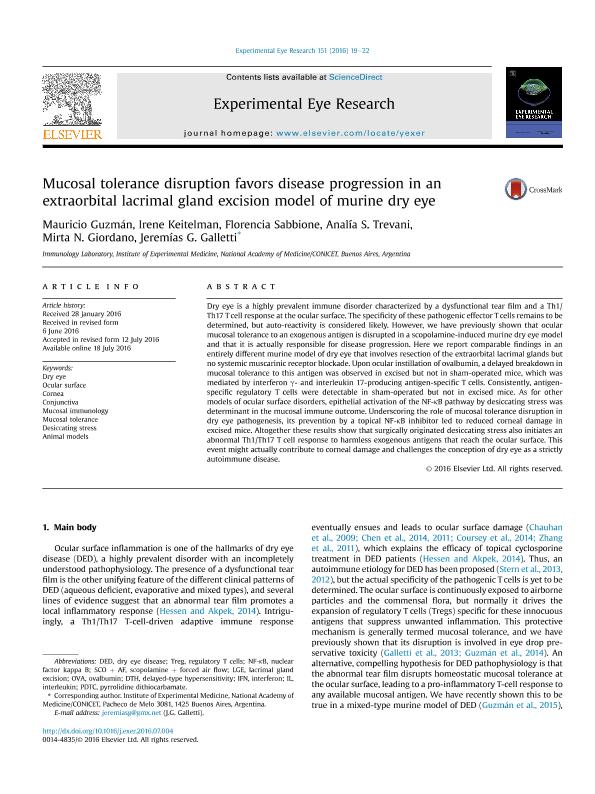Artículo
Mucosal tolerance disruption favors disease progression in an extraorbital lacrimal gland excision model of murine dry eye
Guzman, Mauricio ; Keitelman, Irene Angélica
; Keitelman, Irene Angélica ; Sabbione, Florencia
; Sabbione, Florencia ; Trevani, Analía Silvina
; Trevani, Analía Silvina ; Giordano, Mirta Nilda
; Giordano, Mirta Nilda ; Galletti, Jeremías Gastón
; Galletti, Jeremías Gastón
 ; Keitelman, Irene Angélica
; Keitelman, Irene Angélica ; Sabbione, Florencia
; Sabbione, Florencia ; Trevani, Analía Silvina
; Trevani, Analía Silvina ; Giordano, Mirta Nilda
; Giordano, Mirta Nilda ; Galletti, Jeremías Gastón
; Galletti, Jeremías Gastón
Fecha de publicación:
10/2016
Editorial:
Academic Press Ltd - Elsevier Science Ltd
Revista:
Experimental Eye Research
ISSN:
0014-4835
Idioma:
Inglés
Tipo de recurso:
Artículo publicado
Clasificación temática:
Resumen
Dry eye is a highly prevalent immune disorder characterized by a dysfunctional tear film and a Th1/Th17 T cell response at the ocular surface. The specificity of these pathogenic effector T cells remains to be determined, but auto-reactivity is considered likely. However, we have previously shown that ocular mucosal tolerance to an exogenous antigen is disrupted in a scopolamine-induced murine dry eye model and that it is actually responsible for disease progression. Here we report comparable findings in an entirely different murine model of dry eye that involves resection of the extraorbital lacrimal glands but no systemic muscarinic receptor blockade. Upon ocular instillation of ovalbumin, a delayed breakdown in mucosal tolerance to this antigen was observed in excised but not in sham-operated mice, which was mediated by interferon γ- and interleukin 17-producing antigen-specific T cells. Consistently, antigen-specific regulatory T cells were detectable in sham-operated but not in excised mice. As for other models of ocular surface disorders, epithelial activation of the NF-κB pathway by desiccating stress was determinant in the mucosal immune outcome. Underscoring the role of mucosal tolerance disruption in dry eye pathogenesis, its prevention by a topical NF-κB inhibitor led to reduced corneal damage in excised mice. Altogether these results show that surgically originated desiccating stress also initiates an abnormal Th1/Th17 T cell response to harmless exogenous antigens that reach the ocular surface. This event might actually contribute to corneal damage and challenges the conception of dry eye as a strictly autoimmune disease.
Archivos asociados
Licencia
Identificadores
Colecciones
Articulos(IMEX)
Articulos de INST.DE MEDICINA EXPERIMENTAL
Articulos de INST.DE MEDICINA EXPERIMENTAL
Citación
Guzman, Mauricio; Keitelman, Irene Angélica; Sabbione, Florencia; Trevani, Analía Silvina; Giordano, Mirta Nilda; et al.; Mucosal tolerance disruption favors disease progression in an extraorbital lacrimal gland excision model of murine dry eye; Academic Press Ltd - Elsevier Science Ltd; Experimental Eye Research; 151; 10-2016; 19-22
Compartir
Altmétricas



